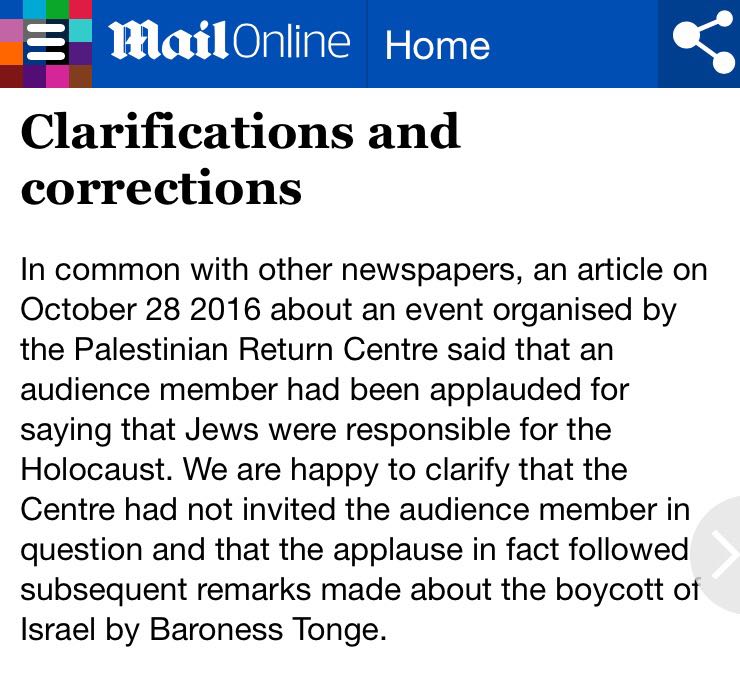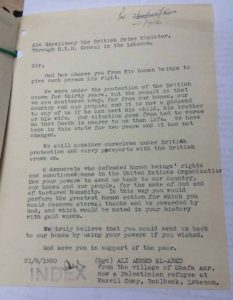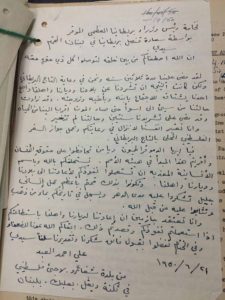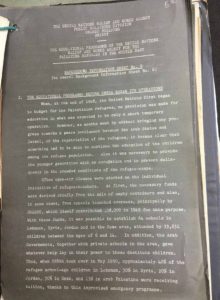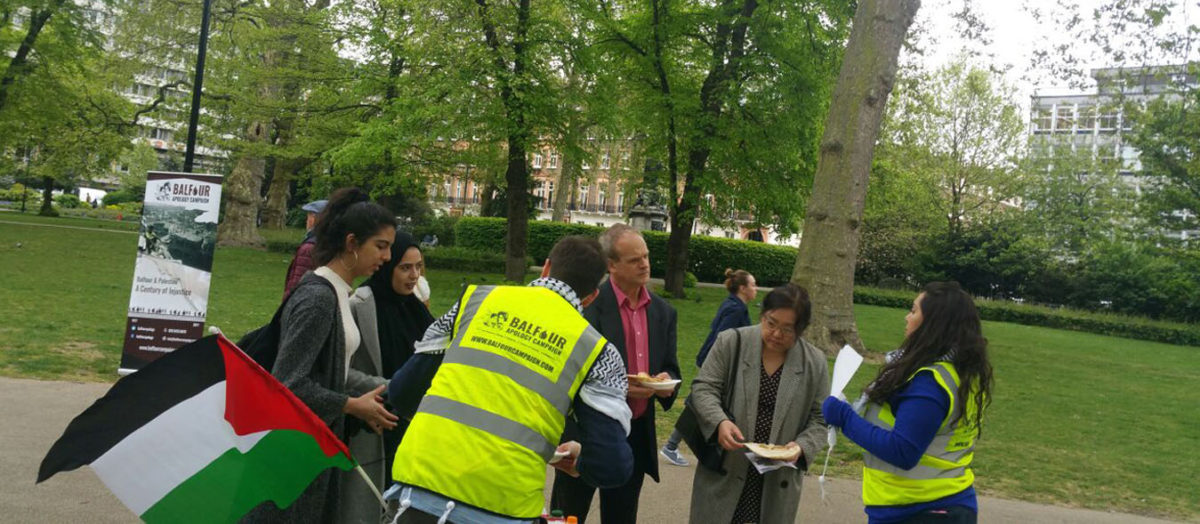
Balfour Petition Continues to Garner Signatures after UK Gov’t Denies Palestinians Apology
London – 24 April 2017
A petition urging the UK government to make an apology over the historical repercussions of the Balfour Declaration continues to garner signatures from the British masses.
The petition, launched by the Palestinian Return Centre (PRC) as part of the Balfour Apology Campaign, has reaped dozens more signatures from students at SOAS University of London, Birkbeck College, and the University College of London (UCL).
A number of students also vowed to volunteer at upcoming events to be initiated at British campuses in order to win over more signatories.
Efforts have also been at top gear by PRC to reach a 100,000-signature threshold in an attempt to make the petition eligible for a House of Commons debate and raise awareness about the domino effects of Britain’s imperialistic history on the Palestinian people.

UK Gov’t Claims Partial Responsibility for Tragic Upshots of Balfour Declaration
London, April 23rd 2017
The UK government claimed, in an official response to a petition pushing for an official apology over the Balfour Declaration, partial responsibility for the calamitous repercussions of the pledge on thousands of Palestinians.
“We recognise that the Declaration should have called for the protection of political rights of the non-Jewish communities in Palestine, particularly their right to self-determination,” the statement read.
PRC believes that the statement heralds a turn for the better in the government’s position as regards the Balfour Apology Campaign and signals an act of auto-criticism vis-à-vis the legitimacy of the Palestinian anti-occupation struggle.
The government response, dubbing the Balfour Declaration “an historic statement for which HMG does not intend to apologise” and of which the government is “proud of [its] role in creating the State of Israel” sparked anger among the pro-Palestine masses.
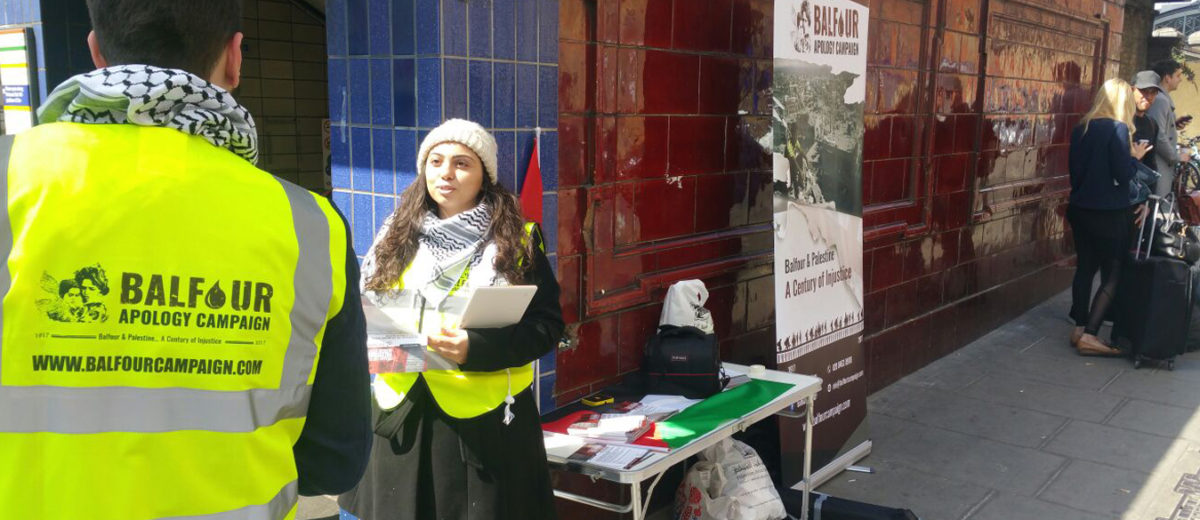
2nd Phase of Balfour Apology Campaign Kicks Off in London Streets
London – 20 April 2017
Advocates of the Balfour Apology Campaign (BAC) took to London streets in an attempt to garner more signatures over a petition urging the UK government to make an apology over the Balfour pledge.
BAC campaigners flocked to Paddington Station, trying to win over thousands of signatures from the masses.
The move comes a few days after the petition received over 12,000 signatures, raising expectations of a gracious apology from the British government.
Efforts have, meanwhile, been in full swing to reach a 100,000-signature threshold in an attempt to make the petition eligible for a House of Commons debate.
The petition makes part of PRC’s underway endeavours to urge the British government to apologise for the tragic upshots of the Balfour pledge and to backtrack on its intent to mark the centenary of the declaration.
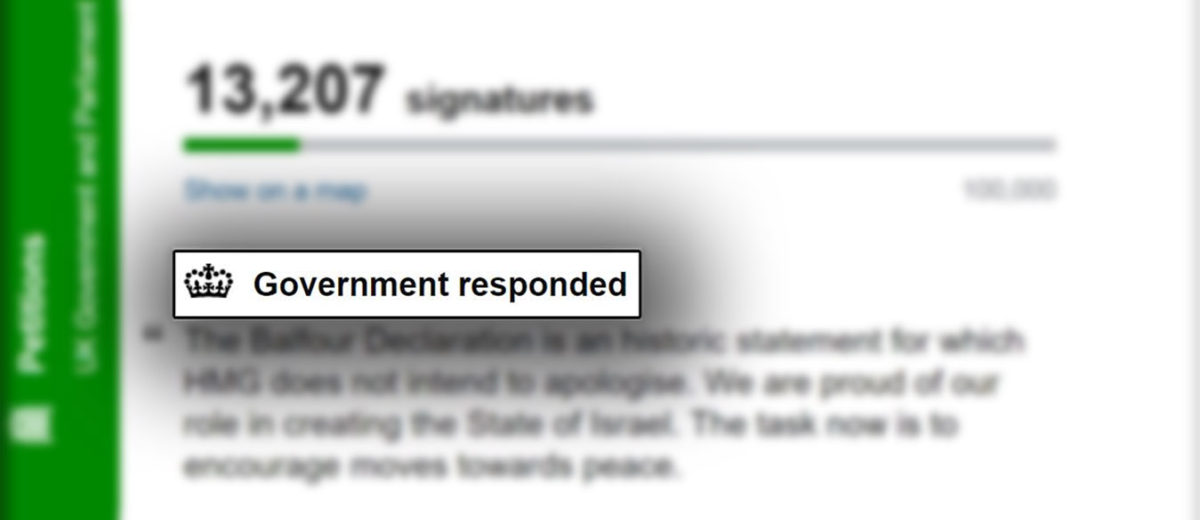
British Government Denies the Palestinians an Official Apology for Balfour Declaration
London – 22 April 2017
The Palestinian Return Centre has re-launched in October 2016, its campaign which started in 2013, titled as “Balfour Apology Campaign”, demanding the United Kingdom Government to officially apologies for its past colonial crimes in Palestine.
On February 2017 the Palestinian Return Centre launched a petition on the British Parliament official website demanding Her Majesty’s Government to openly apologize to the Palestinian people for issuing the Balfour Declaration. The colonial policy of Britain between 1917-1948 led to mass displacement of the Palestinian nation and HMG should recognize its role during the Mandate and now must lead attempts to reach a solution that ensures justice for the Palestinian people. This petition has been signed by 13,269 signatures, in which guaranteed an official response from the British government.
https://petition.parliament.uk/petitions/184398
Today, on 22 April 2017 the British government has responded officially, and its response has caused an outrage, deep disappointment and distress to Palestinian people.
The Balfour Apology Campaign (BAC) strongly denounces The United Kingdom Government position, in which clearly denying the Palestinian people their legitimate and along-awaited apology.
The official British government response to our petition is humiliating, arrogant and emphasizing the British government unconditional endorsement to the brutality of the Israeli governments against the Palestinian people. The fact that the British Government has stated in this response its pride in creating the state of Israel without acknowledging the suffering and injustice inflected on the Palestinian people as a consequence of the Balfour Declaration, is an alarming and an unacceptable position, in which deepening the British government role in denying the Palestinian people their fundamental rights.
It is alarming that the Government’s statement justifies the creation of Israel for religious reasons by stating, “In that context, establishing a homeland for the Jewish people in the land to which they had such strong historical and religious ties was the right and moral thing to do, particularly against the background of centuries of persecution.”
Such statement will only fuel the conflict as it gives religious motivation for the creation of Israel.
The statement shows ignorance of the facts and history and also ignore the Palestinian existence there for thousands of years.
In addition, the official response by the British government has also included a dangerous position in relation to the issue of illegal Israeli settlements, when including “land swap” as one of the elements that should be included in any suggested future two state negotiations, in which is illegal by international law.
And when it comes to the right of return to the millions of Palestinians that were drove forcibly out of their homes and lands by Israel as a result for Israeli atrocities in which Balfour Declaration was their umbrella to justify their horrific acts against the Palestinians, now the British government suggesting as part of the negotiation there would be an alternative solution for the Palestinians other than their right to return to their homes, in which is unacceptable, unjust and simply adopting the Israeli government position on the cost of the legitimate rights of many Palestinians.
The flaws-filled statement also misleads the public opinion that Britain is working towards the self-determination of the Palestinian people. For decades, the successive UK government failed in obliging Israel to achieve its peace process commitment and strengthened Israeli occupation, particularly the military industry.
We do not accept the official response that we have received from the British Government today, therefore, we will continue all our efforts, using all available channels, whether political, legal, public campaigns and media in order to gain the acknowledgement, the apology and the impartial political policies from the British government to the Palestinian nation collectively.
The British government denial of the Palestinian suffering as a consequence to its historic role in creating the ongoing injustice inflected on them, in addition to the current official position that the British government has communicated with us, we are left more determined to continue our legitimate campaign until we achieve all our outlined targets in this campaign.

May PM Tiptoes Around Balfour Apology Question by AlJazeera
The incumbent Prime Minister of the UK Theresa May sidestepped a question on the government’s position as regards underway calls to apologize for the Balfour Declaration during her stopover in Jordan.
When asked by AlJazeera correspondent about whether the British government would make an apology over the notorious Balfour pledge, May failed to provide a straightforward answer, and responded by restating the government’s standpoint vis-à-vis the Arab-Israeli conflict.
In an exclusive interview with May, Head of AlJazeera’s office in Jordan, Hassan AlShoubaki referred to underway attempts to mark the Balfour centenary on November 2, wondering about whether May’s government would apologize to the Palestinians for the tragic fallouts of the declaration.
May failed to deal with the issue in a clear-cut manner, saying the government has been seeking ways to boost Israeli-Palestinian talks, push for a two-state solution, and work on the establishment of a terror-safe Israeli State besides a sovereign Palestinian State.
A campaign urging the British government to apologize for the Balfour Declaration has been launched by PRC, amid emerging reports on the government’s intent to mark the centenary of the pledge. A petition launched by PRC to that very end managed to garner nearly 10,000 signatures in just a few weeks.
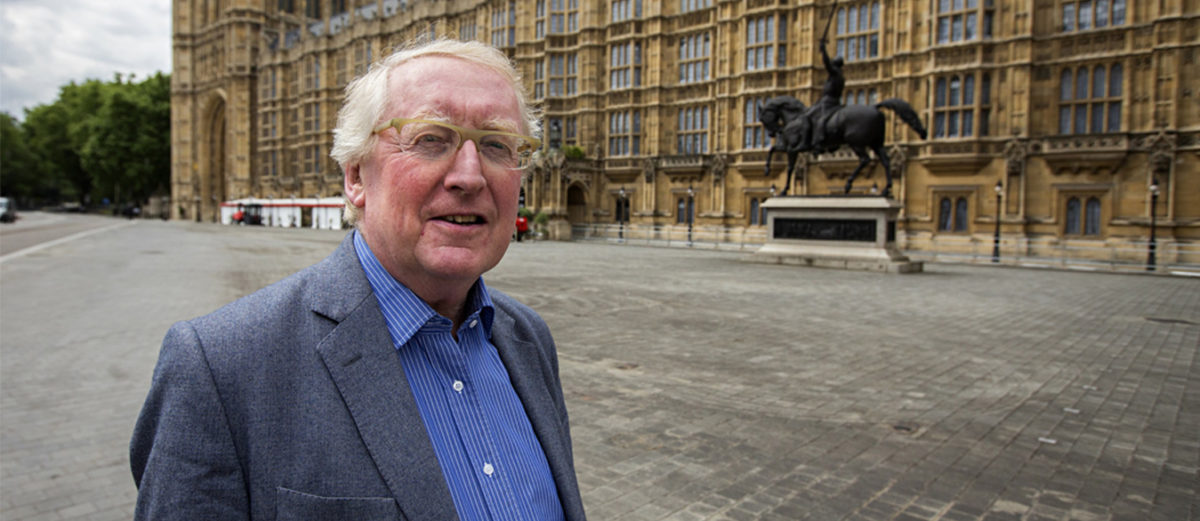
Lord Warner Urges UK Gov’t to Make Gracious Apology for Balfour Declaration
London – 4 April 2017
Lord Norman Warner urged the British government to make an apology over the notorious Balfour Pledge during a lengthy debate hosted at the British House of Lords on Monday.
Lord Norman called on the British government to assume its historical responsibility for the tragic fallouts of the Balfour pledge, which gave, one hundred years ago, green light for the establishment, in Palestine, of a national home for the Jewish people.
In Warner’s terms, the British government has failed to protect the rights of existing non-Jewish communities, in a barefaced contravention of the text of the letter.
Speaking at the debate round, Minister of State for the Commonwealth and the UN at the Foreign and Commonwealth Office, Baroness Joyce Anelay, said that the British government will mark the Balfour centenary with pride, adding that a guest of government invitation was extended to the Israeli Prime Minister, Benjamin Netanyahu, to visit the UK on the centenary.
“We are proud of our role in the creation of Israel,” said Baroness Anelay of St Johns. “However we recognize that the declaration should have called for the protection of political rights of non-Jewish communities in Palestine, particularly their right to self-determination. This is why we support a two-state solution.”
Warner leveled heavy criticism at the successive British governments, both under the British mandate and subsequently, for having failed to protect the Palestinian people, urging the government to rather mark the centenary with a gracious apology for the agony that that failure has caused.
Lord Warner’s comments were delivered during his chairmanship of a seminar staged by PRC to discuss the issue. A plethora of academics and diplomats were in attendance. A number of pro-Israel speakers were kicked out of the room for breaching the rules set for the debate round.
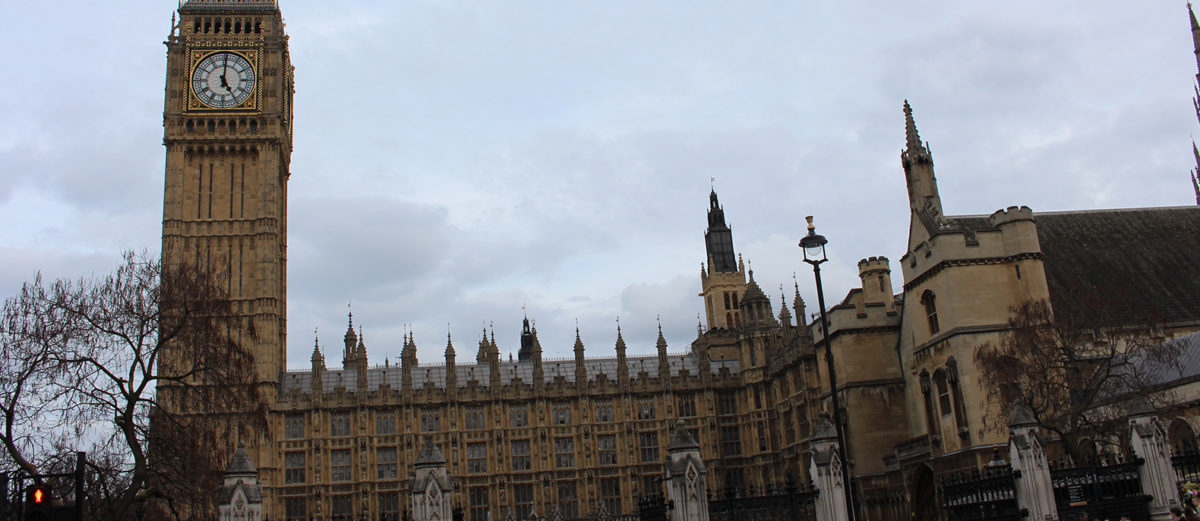
Baroness Tonge Hosts Debate on UK Gov’t’s Intent to Celebrate Balfour Pledge
London – 29 March 2017
A debate was organised by the Palestinian Return Centre (PRC) on Tuesday evening at the British House of Lords under the patronage of Baroness Jenny Tonge to discuss underway arrangements by the UK government to mark the notorious Balfour Declaration.
The event, held under the slogan “No for Celebration . . . Yes for Apology”, was chaired by Lord Norman Warner. A number of academics were in attendance.
A minute of silence was held at the onset of the event in memory of the victims of the Westminster terror attack and of the departed pro-Palestine MP Gerald Kaufman.
Keynote speaker Professor Salman Abu Sitta held the UK historically responsible for the fallouts of the Balfour Declaration, which resulted in the influx of thousands of Jewish immigrants and Zionist gangs to Palestine.
Speaking on behalf of AlSabil Friends NGO, Mark Pattison highlighted the key role played by the British Church in ongoing campaigns promoting Palestinians’ infringed rights.
Palestinian writer, Dr. Ghada Karmi, stressed Palestinians’ inalienable right of return to their motherland and the tragic upshots of the Balfour pledge on the refugees’ cause. She slammed the international community for their apathy as regards the status quo.
British author and journalist David Cornin briefed the audience on the finding of his book Balfour’s Shadow: British Support for Zionism and Israel, slated to be published in the near future. The book covers the repercussions of the Balfour pledge on the entire region and the wars sparked by the declaration.
PRC’s head Majed AlZeir concluded the seminar with an extensive note on PRC’s efforts to urge the British government to apologize for the Balfour Declaration and to pin down the ad hominem campaigns waged by the Israeli lobby against the center over the past few months. AlZeir further underlined the findings of a report by the Parliamentary Inquiry Committee acquitting Baroness Tonge of anti-Semitism allegations.

Connecting Palestinian Archives
Researching the national history of a stateless people always necessitates collecting disparate documents from a wide range of archives. For the past two years I have been researching my PhD thesis on the history of the Palestinian refugee camps and the organisation responsible for them, UNRWA (the UN Relief and Works Agency for Palestine refugees).
In the absence of a Palestinian national archive, the relevant records are dispersed across the world, and it is left to the researcher to pull them together and examine the collective evidence. The relevant archives can be found not only in the Middle Eastern countries where the camps are located, but also in the Western states that have played such a key role in regional politics, particularly the US and UK.
The National Archives was the first collection I looked at for this project. My decision to start here was taken largely for logistical reasons; commitments kept me in London during the first few months of my PhD. I had expected to find a small amount of useful supplementary evidence in Kew, rather than anything crucial or revelatory. Initially, my fairly mundane days in the archive bore this out. I found useful but dry UNRWA records from the Agency’s early days, and letters between British and American diplomats about the political impact of the refugee crisis. The documents were informative, important, and expected.
Yet among them were some unexpected gems. I was particularly struck by a letter to the Prime Minister from Ali Ahmed El-Abed, a Palestinian pleading for the UK to enforce the refugees’ right to return to Palestine. He had written:
We were under the protection of the British crown for thirty years, but the result is that we are scattered away, far from our homes, our country and our people… Our situation goes from bad to worse so that Death is nearer to us than Life. We still consider ourselves under British protection and carry passports with the British crown on. Use your powers to send us back to our country.
Ali Ahmed El-Abed’s letter to the British Prime Minister in 1950 (catalogue reference: FO 1018/73)
The original handwritten letter from Wavel Refugee Camp in Lebanon (catalogue reference: FO 1018/73)
I had not expected to find much in the way of refugee voices in the state archives of the former Mandate power, and letters such as this added unanticipated personal notes to the dry diplomacy.
On completing my research in Kew, I judged that as expected, I had found some useful supplementary documents with relatively low-key significance. What I did not realise at that stage was the true importance of many of the documents, which only became apparent when contextualised with evidence from archives elsewhere.
Upon visiting the latter, I discovered that letters like that I found at Kew were not outliers, but in fact typical of a wider trend for Palestinian refugees to protest their plight in writing. Across archives in Jordan and Lebanon, I found similar letters to national and international authorities, alongside organised petitions. They were crucial evidence for what became a central part of my thesis; namely, the fact that the Palestinian refugees were not ignorant passive recipients of international aid, but active agents who were fully aware of their rights and very quickly organised themselves to demand them.
My research in the Middle East threw up even more surprises about the diplomatic documents to which I had previously given little thought. During months of research at numerous archives in Jordan and Lebanon, I was unable to track down records about the beginning of UNRWA’s schooling programme for Palestinian refugee children. The UNRWA archive in Amman contained detailed information about later decades, as did the Institute for Palestine Studies in Beirut, but the early days were drawing a blank. Returning to my notes from Kew, I was astonished and delighted to find that a key document was already in my hands. Amidst the FCO’s records about the Palestinian refugee situation was an early Information Sheet from UNRWA detailing precisely when and how the first camp schools were started.
Details about the first schools for Palestinian refugees in exile eluded me in numerous international archives, but are found here. Background Information Sheet No. 9 from the UNRWA Public Relations Division, 5 June 1952 (catalogue reference: ED 157/366)
This document provided a crucial complement to later records detailing UNRWA’s interactions with the Palestinian refugees about the schooling programme. Using the evidence from records like that in Figure 3, I was able to establish that the refugees had pushed from the beginning for a full education programme. Yet out of context the document’s significance was greatly diminished. Its increased value when combined with others exemplifies the importance of connecting collections, and the need to reconsider individual documents in the context of others in order to arrive at more nuanced and comprehensive conclusions.
[Source]: Connecting Collections: http://blog.nationalarchives.gov.uk/blog/stateless-history-connecting-palestinian-archives/#more-32227

Balfour Apology Campaign urges Royal Family to reject visit invitation to Israel
London, 10 March 2017
Balfour Apology Campaign (BAC) is concerned about the possible British Royal Family visit to Israel. Reports in British media have suggested an unprecedented Royal Family visit to Israel following the visit of Foreign Secretary Boris Johnson meeting with Israeli PM and Israeli President.
According to the Independent “The first state visit by a British Royal to Israel will go ahead this year, Whitehall sources have suggested.”
While the uncertain visit has not been confirmed by the Royal Family our campaign urges the royal Family to reject this possible visit.
The royal family visit to Israel is seen by the Campaign and Palestinians under Occupation and in the Diaspora as “unhelpful”. Such a visit will only encourage Israel to continue its human rights violations against Palestinians and provide free publicity to cover Israel’s ongoing settler colonialism, occupation and apartheid policies.
The Campaign will communicate with the royal family asking for clarification on this matter.
